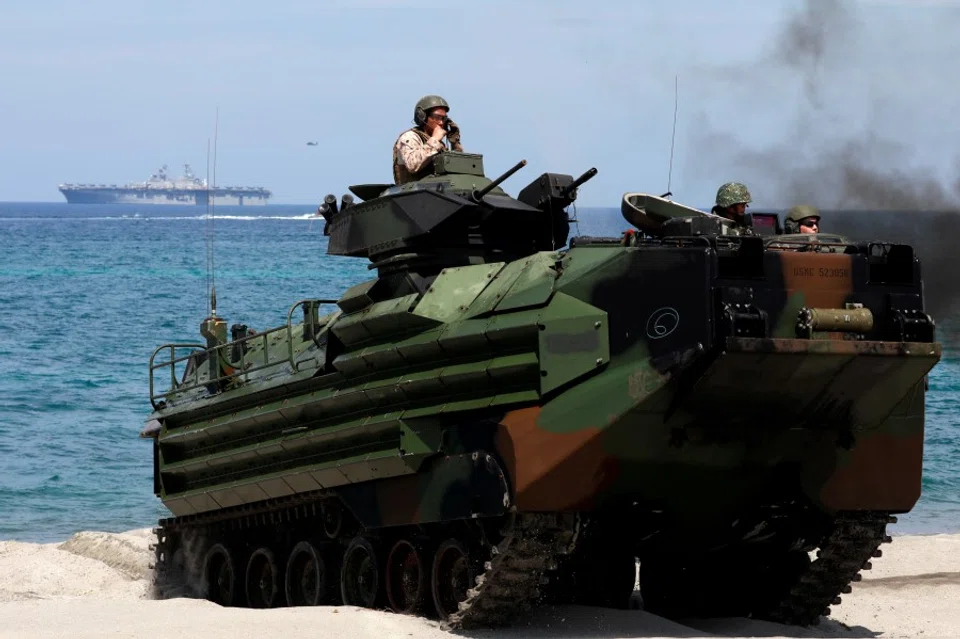Visiting Forces Agreement: Uncle Sam still welcome for another year in the Philippines
The Philippines has suspended the planned termination of the 1998 Visiting Forces Agreement with the US. But the alliance is not out of the woods yet.

A persistent narrative holds that the US is losing influence to China in Southeast Asia and that Beijing has "won" in the South China Sea. Philippine President Rodrigo Duterte has played an outsized role in lending credence to this misleading narrative. However, on Monday, Duterte surprised us all when his administration announced that it was suspending the abrogation of the 1998 Visiting Forces Agreement (VFA).
The VFA was instrumental in normalising military ties between the US and the Philippines after an acrimonious squabble in the early 1990s which led to the closure of all American bases in 1992. The VFA provided a legal framework for US-Philippine security cooperation to resume, including ship visits, combined exercises and the deployment of military advisers.
On 11 February, however, in a fit of pique following America's refusal to grant a visa to his former police chief turned senator, President Rodrigo Duterte informed Washington that the Philippines would withdraw from the VFA. This triggered the treaty's 180-day cooling period that was to end on 9 August.
Over the past few months, tensions in the South China Sea have been raised by a few notches as Beijing has taken advantage of the pandemic to double down on its claims.
Duterte's decision was a blow to the Trump administration's Free and Open Indo-Pacific (FOIP) policy which seeks to bolster America's military presence in the region by reinvigorating defence ties with allies and partners. But it was a boon to China and Russia. The central organising principle of the FOIP (and related documents such as the 2018 National Defense Strategy) is the identification of the two powers as America's strategic competitors.

So why did Duterte change his mind?
Philippine Foreign Secretary Teddy Locsin Jr pointed to the impact of Covid-19 and geopolitical tensions. In a statement released on Wednesday (3 June), he noted "the vast and swiftly changing circumstances of the world, in a time of pandemic and heightened superpower tensions". As such, a "world leader must be quick in mind and fast on his feet, for the safety of our nation and the peace of the world", he said.
The Philippines' deteriorating domestic security is also likely to have been a factor in Duterte's climbdown.
Two issues, in particular, are likely to have influenced Duterte's thinking, or at least that of the country's national security establishment which remains generally pro-American.
Over the past few months, tensions in the South China Sea have been raised by a few notches as Beijing has taken advantage of the pandemic to double down on its claims. In February, in a hostile act, a Chinese warship lit up a Philippine naval vessel with its fire-control radar. In April Manila expressed solidarity with Hanoi, and criticised Beijing, after a Chinese coast guard vessel sank a Vietnamese fishing boat (a similar incident took place in Philippine waters in June 2019). In the same month, the Philippines also objected to China's establishment of two administrative districts to cover the disputed Paracels and Spratlys. The Philippine military will also have been unnerved by the uptick in Chinese military activities on its artificial islands in the Spratlys, including deployments of early-warning and anti-submarine patrol aircraft. Capacity-building support from the US enables the Armed Forces of the Philippines (AFP) to monitor Chinese activities in its exclusive economic zone. Without the VFA, that support will end.
The Philippines' deteriorating domestic security is also likely to have been a factor in Duterte's climbdown. In Mindanao, hostilities have resumed between communist insurgents and government forces, as well as between the AFP and a separatist group opposed to a 2014 autonomy agreement. In April, the Abu Sayaaf, a terrorist group linked to the Islamic State in Iraq and Syria (ISIS), killed 11 Philippine soldiers in Mindanao. Since the early 2000s, US special forces advisers have provided advice to the AFP in Mindanao, and provided critical support during the 2017 siege of Marawi. If the VFA is abrogated, America would have to withdraw its military advisers from the Philippines.
US allies, particularly Australia and Japan, may also have raised their concerns with the Duterte administration over how the annulment of the VFA would undermine their burgeoning defence cooperation with Manila...
Since 11 February, both Locsin and Defence Secretary Delfin Lorenzana have no doubt been trying to persuade their bosses of the strategic benefits the VFA brings to the Philippines in the South China Sea and Mindanao.
US allies, particularly Australia and Japan, may also have raised their concerns with the Duterte administration over how the annulment of the VFA would undermine their burgeoning defence cooperation with Manila, given their close collaboration with the US military, including in the Philippines.

And despite Trump's transactional attitude towards the VFA, and a comment from Duterte's spokesperson that the Philippines was not seeking to renegotiate the agreement, quiet behind-the-scenes talks between defence officials and diplomats must have been taking place these past four months. On 19 April, the leaders of the two countries spoke on the phone, during which Trump pledged an additional US$5.3 million to help the Philippines combat the spread of Covid-19. According to CNN, the two men also discussed ways to strengthen US-Philippine security ties. It does not take much imagination to figure that the VFA would have been front and centre.
Not surprisingly, America welcomed Duterte's decision. The US Embassy in Manila said that the "longstanding alliance has benefited both countries" and that they "look forward to continued close security and defense cooperation with the Philippines". Some of the nearly 300 US-Philippine exercises planned for 2020 can now proceed (subject to restrictions imposed by Covid-19).
But the US-Philippine alliance is not out of the woods yet. The suspension is for a maximum of 12 months. During this period, the Philippines may wish to revisit Lorenzana's suggestion in 2018 that the two sides revise the bedrock of the US-Philippine alliance, the 1951 Mutual Defense Treaty. Washington will be loath to do so, especially if Manila demands an explicit security guarantee that covers its territorial claims in the Spratlys. As far as the US is concerned, in alliances ambiguity is sometimes a strength. As such, another mercurial decision by Duterte a year from now cannot be ruled out.
This article was first published as ISEAS Commentary 2020/74 "Visiting Forces Agreement: Uncle Sam Still Welcome for Another Year" by Ian Storey.





![[Photos] Fact versus fiction: The portrayal of WWII anti-Japanese martyrs in Taiwan](https://cassette.sphdigital.com.sg/image/thinkchina/3494f8bd481870f7c65b881fd21a3fd733f573f23232376e39c532a2c7593cbc)